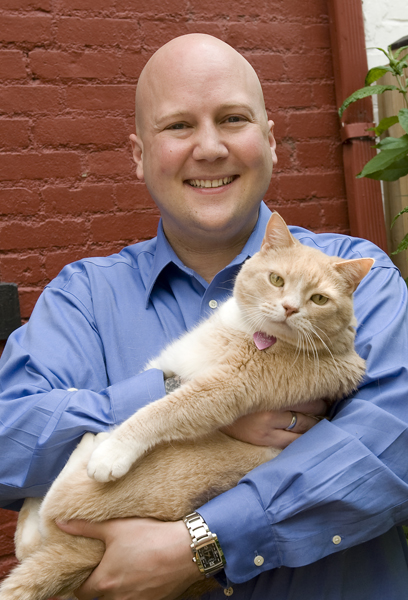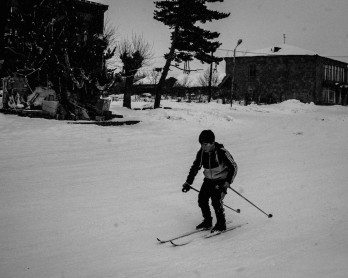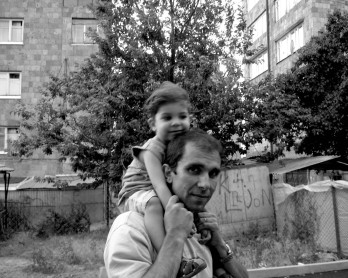Interview: The Humane Society’s Michael Markarian
A third generation Armenian-American who grew up in Buffalo, New York, a town once known for being America’s “City with a Heart,” Executive Vice President of the Humane Society of the United States Michael Markarian now lives in Washington D.C, where he works to pass state laws and federal statues to protect animals, including laws to make interstate dogfighting and cockfighting activities a felony offense. He has had Op-Ed pieces published in the Los Angeles Times, Atlanta Journal-Constitution and the Huffington Post, as well as writing his own blog “Animals & Politics.”
He spoke with ianyan about his passion for animal protection, his Armenian roots and how animal compassion is a mainstream issue.
Q: How did you become involved with the Humane Society of the United States?
A: Well I always had a real interest in animals when I was a kid. My family had cats and my aunts and uncles had dogs, so I was intrigued by animals and interested in them. When I was in high school, I started learning more about the animal protection movement and got involved with some advocacy groups and volunteered at local animal shelters and just became immersed in it. When I came to Washington D.C to go to college, I started volunteering with organizations, I got to learn more about non-profit and advocacy work and then I eventually got a job in 1993, with The Fund for Animals founded by Cleveland Amory. I worked for him for a number of years and our group joined forces of the Humane Society of the United States (HSUS) in 2005. We feel there’s a duplication in the animal movement, because there are so many organizations, so we’re trying to unify the different groups and build a larger group that can have an impact.
Q: Why is animal welfare and protection such an important issue for you?
A: I really believe that we have so much power over animals, we have all the power in the relationship and they’re here and we can do essentially whatever we want with them, and we have an obligation to be kind and merciful and protect them. I really believe it’s a moral obligation that animals are in our power and we have a responsibility to care for them and be good stewards and protect them from cruelty. They’re probably the most powerless of any group; they can’t speak up or speak for themselves, so this is a cause we believe is a mainstream value whether people are liberal or conservative, no matter where you fall on the spectrum, caring about animals and being compassionate and being kind and merciful is a value that most people share.
Q: Are you vegetarian/vegan? If so, since when and why?
A: I became vegetarian and vegan when I was a teenager, so it’s been a while. It works for me, I believe it’s a personal choice, the HSUS is not an all or nothing organization. We have a lot of people who are vegan or vegetarian and a lot who are meat eaters. We believe wherever they fall on the spectrum they can plug in and make a difference for animals. If people are interested in reducing their meat consumption or trying to build more vegetarian meals in their diet, we believe that’s a good choice. We raise 10 billion animals for food in the United States and 50 billion worldwide. Factory farming is a major problem both for animals and human health and the environment.
By reducing their consumption, by choosing products that are more humanely raised like cage-free eggs or humanely raised animal products, we believe those are all good choice. I think its easier than ever, you don’t have a sacrifice quality or taste whether people want to do it full time or once in a while, even Armenian food. My wife and I make a lot of Armenian dishes vegetarian. We have a couple of Armenian cookbooks (Treasured Armenian Recipes by the Detroit Women’s Chapter of the Armenian General Benevolent Union and “Armenian Cooking Today” by Alice Antreassian), and we make keshkeg (wheat with chicken) – with vegetable broth and any kind of vegetarian chicken that is chopped and shredded. The Armenian cuisine is very rich in vegetable dishes, green beans and chickpeas and eggplants.
Q: Tell me about your Armenian background.
A: I’m third generation Armenian-American. My great grandfather, Charles Markarian came over from Armenia in 1915, during the Armenian Genocide, He escaped when he was 16-years-old and landed in Buffalo, New York and he started as an apprentice for a rug merchant and eventually opened his own business selling oriental rugs, and later other types of carpeting. That business, Markarian Rugs is still in my family. My family is very supportive of animal protection work, they follow closely what we do at the humane society, I come from a family of animal lovers, they definitely are supportive of the causes.
Q: In my experience (I’m vegetarian) it has been very difficult for me to not feel judged or misunderstood in Armenian circles whenever I have tried to explain my reasons for not eating meat and my deep rooted affection I have for animals – have you experienced anything like this?
A: I haven’t really – I really believe that caring about animals is a mainstream value, people understand why animals need to be protected from abuse. I think a lot of it comes down to language. It’s about human responsibility, it’s not about giving rights to animals, its about our responsibility to protect them and treat them well. I think that no matter what ethnicity you are, or what political affiliation you have – I think this is a basic value we all share that animals should be treated fairly. I do think with the Armenian tradition and history of our people, having the history of a genocide and knowing what its like to be in a situation where others are misusing their power and understand issues of justice, there is an intersection there,. The values of mercy and compassion and justice speak to the Armenian tradition.
Q: In your opinion, what is the best way someone can start to become involved with animal welfare issues?
A: There are a number of ways can get involved, we encourage people to visit our website, sign up for alerts, find out if there is a particular issue they may have an interest in. We believe we all have the power as individuals to make a difference, whether it’s our food choices, or buying cosmetics that are not tested by animals or choosing to buy garments that are not made of animal fur. We can vote with our dollars and encourage companies to be animal friendly.
The Armenian-American community has been particularly politically active and involved, organizing legislative issues. We want people to get involved in animal protection and legislation, urging them to pass animal protection bills, there’s a lot going on in Congress, a lot going on in California – several bills have passed this year, bills that would stop abuses in puppy mills, increase penalty for dog fighting, and a whole range of other issues.
Q: Tell me a little more about the recent “There Ought to Be a Law” contest. Have you received any amazing entries?
A: We’ve received more than 3,000 entries, it’s going to take a lot of work to go through them and choose the winners, I don’t want to reveal any right now, but we encourage people to get involved (the contest ends Oct. 5), a lot of the best legislation often comes from citizen ideas and people who work on animal advocacy issues or work in an animal shelter in their community, they know the challenge and problems the animals are facing. Whether it’s dealing with pets, factory farms or laboratories, we really need the best ideas to be put forward so that we can make an impact in animal protection law making.
Q: What are important bills and acts concerning animals in the pipelines right now that people should know about?
A: I think there’s some real priority bills in the U.S. congress that we’re pushing hard. One of those is a bill to ban horse slaughter for human consumption (Prevention of Equine Cruelty Act). Americans generally do not eat horse meat, there are no horse meat plants in the U.S, it’s a situation where some American horses, about 100,000 a year, are being exported to Canada and Mexico where they are slaughtered for food and their meat is then exported to France, Belgium and other countries that consume horse meat.
It’s more of an opportunistic industry, people can have their pet horses stolen, people by horses at auction or retired race horses, then they are sold to middle men who put them on trucks, who ship them sometimes 1,500 miles away. The method of slaughtering horses is to stab them in the spine with a short knife, it’s just a terrible abuse, we don’t believe Americans view horses as anything but companion animals. The prevention of equine cruelty act that would stop horse slaughter and exports of horses for slaughter.
There’s another bill that we’re pushing which is consumer protection Issue – the Truth in Fur Labeling Act. We’ve done a series in investigations over the last few years and found a lot of fake fur – we had them laboratory tested and they were real animal fur like dog fur from China. The problem under federal law is that most fur coats require labeling species of animals used and country of origin. The major loophole is that if the value of fur is $150 or less, it does not require and labeling at all, so boots and gloves that are made of fur, they often don’t have any labeling, and people assume they’re fake. We want there to be a very clear labeling standard, so people know what they’re getting.
Q: Do you have any pets? If so, what kind and their names?
A: My wife and I have five cats – Oliver, Georgia, Mario, Misty and Lexi. They need meat in order to be healthy, so we buy pet food that is not factory farmed, we try to buy cat food that doesn’t come from factory farms.
Q: Anything else you’d like to add?
A: We are all about celebrating animals, we are a nation of pet lovers and two thirds of American households have pets and I know a lot of Armenian families love dogs and cats – care about these issues. People who want to get more involved can contact us, we want everyone to be part of the solution.
*Editorial Note: If you’re interested in making the vegetarian version of keshkeg, which is also known as harisah, Markarian recommends “Chick N Strips” by Morningstar Farms and a frozen vegetarian chicken by May Wah.






